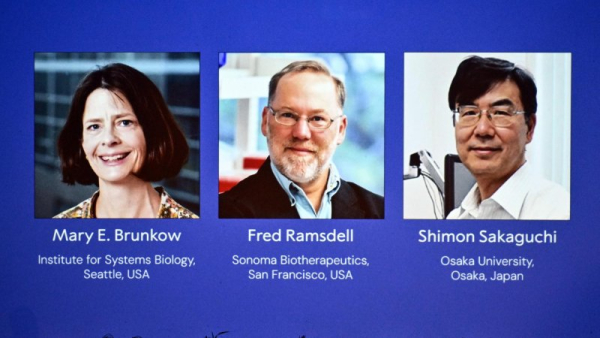
Three scientists were recognized with the Nobel Prize in Physiology or Medicine on Monday for their efforts to clarify how the body defends itself against autoimmune disorders.
The Nobel Assembly at Karolinska Institutet revealed Monday that Mary E. Brunkow, Fred Ramsdell of the United States, and Shimon Sakaguchi of Japan secured the award, valued at $1.17 million, which will be shared among them.
The awardees pinpointed the immune system’s guardians, known as regulatory T cells, which stop immune cells from attacking our own bodies, according to the Nobel Prize’s statement.
“Their findings have been pivotal in our comprehension of the immune system’s operations and why we don’t all experience severe autoimmune conditions,” stated Olle Kämpe, chairman of the Nobel Committee, in a release.
Autoimmune conditions such as rheumatoid arthritis, lupus, Type 1 diabetes, and numerous others arise when our immune system targets components of our own bodies. Some can be deadly.
“T regulatory cells assume a decidedly crucial function in averting or lessening their effect,” Daniel Kastner, esteemed investigator at the National Institutes of Health, conveyed to CNN.
Sakaguchi determined in 1995 that the immune system is more intricate than previously assumed and unearthed a formerly unknown category of immune cells that shield the body from autoimmune conditions.
Brunkow and Ramsdell discovered in 2001 the reason a particular mouse lineage was especially susceptible to autoimmune conditions. They ascertained that the mice possess a mutation in a gene they designated Foxp3. They further demonstrated that mutations in the human counterpart of this gene induce a grave autoimmune ailment, IPEX, which typically manifests in infancy and necessitates a bone marrow transplant.
Two years afterward, Sakaguchi was able to connect the findings. He substantiated that the Foxp3 gene directs the advancement of the cells he recognized in 1995. These regulatory T cells oversee other immune cells and guarantee that our immune systems accept our own tissues.
These discoveries initiated the domain of peripheral tolerance, inspiring the creation of medical interventions for cancer and autoimmune ailments. Several treatments are presently undergoing clinical assessment.
The honorees are:
— Brunkow, 64, holds a Ph.D from Princeton University and serves as senior program manager at the Institute for Systems Biology, Seattle.
— Ramsdell, 65, obtained his Ph.D from the University of California Los Angeles and acts as a scientific advisor at Sonoma Biotherapeutics in San Francisco.
— Sakaguchi, 74, earned his Ph.D from Kyoto University, Japan. He is a distinguished professor at the Immunology Frontier Research Center at Osaka University.
The remaining Nobel prizes will be declared this week.
Sourse: www.upi.com





